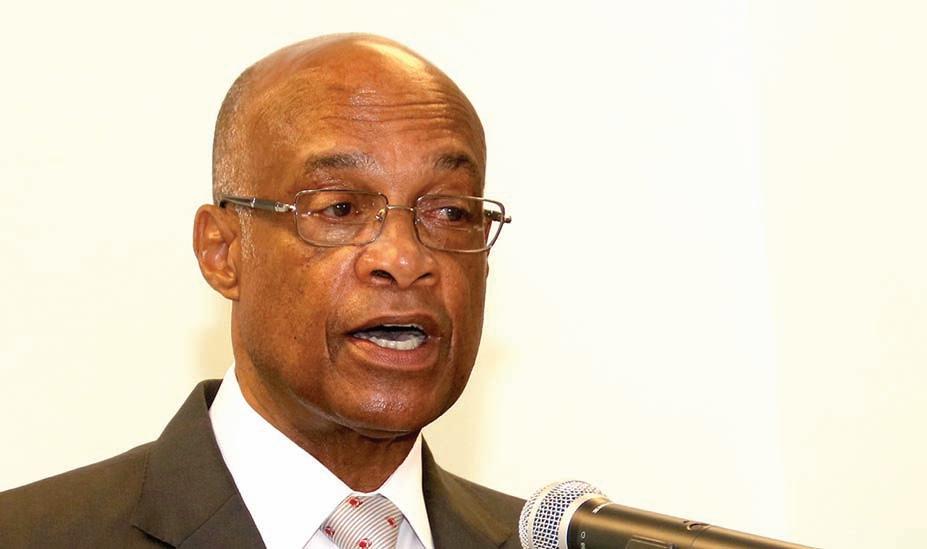
4 minute read
40, 41
Education Press Conference Tackles National Exam Results and Resumption of Face-to-Face Instruction in Schools
Minister of Education Jeffrey Lloyd - January 4th, 2021
Advertisement
On Monday afternoon, January 4th, 2021, as students across the Bahamas returned to classes to begin the new 2021 Easter school term, the Ministry of Education hosted a press conference, primarily to address questions about the national BGCSE and BJC examination results, recently released on December 23rd, 2020, as well as other issues relevant to the resumption of school.
(Visit this link online at www.EleutheraNews. com for the full national exams results - http://eleutheranews.com/?p=23324)
Many islands began the new term with faceto-face instruction, however, mainland Eleuthera and others, including New Providence, Exuma and Abaco continued with virtual-only instruction – as mandated by the current emergency orders, and confirmed by a communication released to the public by the Ministry of Education on Thursday, December 31st, 2021.
During the press conference, Minister of Education the Hon. Jeffrey Lloyd, expressed the Ministry’s goal to begin face-to-face or blended/hybrid instruction on islands not doing so currently in February, saying that Monday, February 1st, 2021 would be an ideal date – dependent on the advice of the Ministry of Health.
Minister Lloyd went on to address the media on the 2020 national examination results, saying, “2020 had its difficulties and there were major, indeed, seemingly insurmountable challenges that occurred, but these challenges were met through the grace of giving.”
He continued, “In offering students the opportunity to take the national exams, in the face of stark challenges – the way ahead was uncertain in numerous ways, but the path was lit by the collective giving nature of those involved. I am convinced that we were all motivated by hope and faith in the education system and I daresay our love of students and country. The support was not given because we had been coerced or because of promised remuneration. Our support was given because we cared for the youth who had been entrusted into our care, and wanted them to accomplish academic goals that they had spent years pursuing.”
In the process, said Minister Lloyd, “the Ministry of Education strove to ensure that all educators and the youth of the nation were treated with the utmost regard for their physical, emotional and mental wellbeing. This was accomplished.”
The Ministry of Education, the minister said, decided to go ahead with the sitting of the Bahamas Junior Certificate (BJC) and Bahamas General Certificate of Secondary Education (BGCSE) examinations because it was a duty to the children of the nation to give them the opportunity to take the exams for which they had been preparing for years.
He continued, providing a summary of results data, saying, “The candidates came from 66 independent or private centres and 50 government centres.
“The total number of grades awarded in 2020 for the Bahamas Junior Certificate (BJC) was 31,878 compared to 40,701 in 2019.
“In 2020, 62.28% of the candidature achieved grades A-D, compared to 65.54% in 2019, 66.76% in 2018, 63.80% in 2017 and 64.30% in 2016.
“Scores in six subjects improved this year: English Language, Mathematics, Art, Craft Study, Family & Consumer Science and Literature. General Science remained unchanged. Seven subjects improved in 2019, a very slight difference.
“Not every candidate takes every subject. Therefore, subject averages speak better to student performance than a national average.
“As for the BGCSE examinations, 6,073 candidates were registered to sit examinations. In 2019, 6,454 candidates registered to sit examinations. Twenty-seven subjects were offered and candidates sat from 1 to 15 subjects. The candidates came from 62 independent or private centres and 39 government centres.
“The total number of grades awarded in 2020 was 15,017 compared to 23,810 in 2019. In 2020, 68.29% of the candidature achieved grades A-D, compared to 70.18% in 2019, 70.05% in 2018, 70.82% in 2017 and 71.27 in 2016.
“Fifteen subjects exhibited improved performance in 2020 compared to 13 subjects in 2019. They are: Auto Mechanics, Biology, Bookkeeping & Accounts, Chemistry, Clothing Construction, Combined Science, Commerce, Economics, Electrical Installation, Food & Nutrition, Graphical Communication, History, Music, Office Procedures, and Spanish. The performance in English Language and Literature remain unchanged.”
The Minister noted, “This is progress and it is indeed encouraging and speaks to the resilience of Bahamian educators and students: “Of course we must applaud ALL students. One student achieved 12 A’s at the BJC level. The highest number of BGCSE subjects achieved with A-C grades was 15, a first, and one student achieved 13 A’s. They are all our nation’s children, the future of our country and we are so proud of them.
“The seven-point grading scale of the BJC and BGCSE national examinations (A-G) indicates measures of positive achievement. It is not a pass-fail scale and we commend all students who took the exams and showed that their years in school had not been in vain. Across the education system, in both, independent and government schools, students achieved grades ranging from A-G, all markers of positive achievement.”
Director of Education, Marcellus Taylor, responding to questions during the question and answer session, immediately following the Minister’s presentation, about the decision taken by the Ministry of Education to hold national exams last year, stated that officials within the Ministry had no regret in giving students the opportunity to show their proficiencies garnered during their years in school. He also emphasized, when asked about the prospect of a repeated 2020 school year, that the Ministry of Education did not hold that position, and no decision had been taken to do so.
In answer to questions about current students’ radiness for upcoming national exams at the end of the 2020/2021 year and possible curriculum adjustments, Director Taylor commented that pacing guides provided by the Ministry to administrators and teachers were expected to allow students to cover the significant portion of the exams’ curriculum that they would need.




